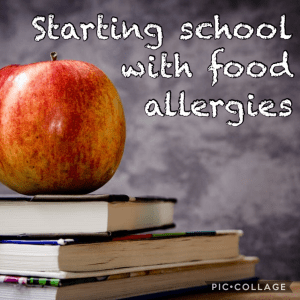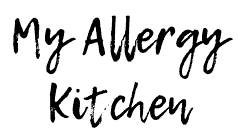
Starting school is an emotional time for any parent - but even more so if your child has food allergies. Suddenly you have to entrust your child's safety to relative strangers. With one teacher responsible for 30 children it's hard not to worry - will they remember your child's food allergies? As a parent, it's up to you to make sure the school is aware of your child's food allergies and exactly what they need to do to keep your child safe.
Food allergy management plan
The law states that all schools have a duty to support pupils with medical conditions, so that they can have full access to education - this includes children with food allergies or suspected food allergies. The school may or may not already have food allergy policies, but you will need to make sure the school creates a written allergy management plan or individual healthcare plan for your individual child. This is important because people take things that are written down more seriously - verbal agreements are easily forgotten.
Meet the teacher
Arrange a meeting with your child's new class teacher to discuss their food allergies and give them the information they need to set up a food allergy management plan. You might also want to ask the headteacher or SENCO (special educational needs coordinator) to come to the meeting too, depending on how severe your child's allergies are and how many accommodations you need. Do this well before your child starts school, so that the staff have time to learn about your child's allergies, ask questions and make any necessary changes. Go in with a positive attitude and aim to establish good communication with everyone involved. If you have a lot of information you need to get through at the meeting, it might help to email the key points to the school in advance, so that they can have time to read it before the meeting.
What information do I need to give?
You will need to make sure you give the school all the information they need to write the allergy management plan. This could include:
- Exactly what food(s) your child is allergic to.
- Signs and symptoms of a reaction.
- Medicines, when to give them and what dosage your child needs.
- Exactly what accommodations your child needs to prevent an allergic reaction, whilst ensuring that they can be fully included in all aspects of the day (see below).
- What your child can do themselves e.g. refusing food offered by another child.
- What support your child needs e.g. supervision at mealtimes.
- Who in the school/setting needs to be aware of your child’s allergies.
- Which staff will be available to provide support.
- Staff training required e.g. epinephrine auto-injector training.
- Additional support around educational, emotional and social needs e.g. tackling allergy bullying.
- What to do in an emergency, including who to contact.
- Practical requirements such as hand washing and seating arrangements.
- Managing school trips and other special activities.
Food allergy risks at school
In addition to meal and snack times, there are some other activities where your child could come into contact with food allergens. Make sure your child's teacher is aware if any of these are a potential problem:
- Birthday or special occasion celebrations involving food.
- Counting or sorting with beans, pasta, grains, sweets or other small foods.
- Sensory tables that use grains, pasta, sweets or other small foods.
- Arts and crafts projects using food containers such as egg cartons, milk cartons, drinks cartons, yogurt pots and so on.
- Play kitchen or home corner with real food containers.
- Musical instruments – mouth blown instruments may be contaminated.
- Hand washing soap may contain allergens.
- Cloth hand towels may be contaminated with allergens.
- Finger paint, play dough and other craft supplies may contain food allergens.
- Gardening activities such as making bird feeders or planting seeds may be a risk for contact with some food allergens.
Special Accommodations
Here are some suggestions of special accommodations you may want to ask for to reduce your child’s exposure to allergens. These adjustments are simple and don’t cost a lot of money but will make all the difference in keeping your child safe. Remember that your child is an individual so you need to do what is best for them. For example, if your child is allergic to nuts, you may be able to ask the school to be completely nut-free. However this won't be possible if your child is allergic to a more common food like milk, eggs or wheat.
- Keep a photo of your child with a reminder of their allergies stuck on the wall in a place where members of staff can see it e.g. in the school office, in the staff room, in the cafeteria or in the classroom.
- Allergen-free school dinners, if available.
- Have non-food rewards and treats.
- All children to wash hands before and after eating or handling food. Baby wipes are also ok for cleaning hands, but antibacterial hand gel is not as it kills germs but does not remove food proteins.
- Avoid use of allergens in class projects, parties, holidays and celebrations, arts, crafts, science experiments, cooking, snacks or rewards.
- Wash tables, chairs and any other eating areas before and after each meal and snack.
- Safe seating arrangements – remembering that your child should always be socialising as normally as possible and never sitting by themselves to eat.
- Keep eating areas separate from learning/playing areas.
- Store and prepare food food safely to prevent cross-contact.
- For birthdays and other celebrations, only allow pre-packaged food with ingredients labels rather than homemade.
- Ask for a written letter to be sent home to all parents explaining that there is a child with food allergies in the class and what they can do to help.
Starting School with Food Allergies
My daughter is allergic to milk and soya, so I'll be speaking to her new teacher before the summer holidays. I already have a 7 year old at the school, who has mild food intolerances, and there are other children at the school with allergies and coeliac disease, so I know they are pretty aware of the issues. I also know from preschool that she can speak up for herself if she thinks she is not supposed to eat something. Luckily her allergies are not severe, she can tolerate baked milk, and her symptoms are mainly gastro-intestinal. Overall I feel quite optimistic that they will be able to manage her allergies safely. My main concerns are about making sure she is fully included in school life and not made to feel different.
Has anyone else got a child with food allergies starting school in September? Or have you been through this in past years with your child?
Update: You can now read about our experiences of handling food allergies at school!


[…] This is an excellent book to help your child answer all their questions about food allergies. Emma has handled difficult topics very sensitively, and I'm pleased to say it covers both IgE and non-IgE food allergies. I think this would be perfect if your child has a lot of anxiety about their allergies, or you want to develop their understanding as they start to get ready for nursery or school. […]